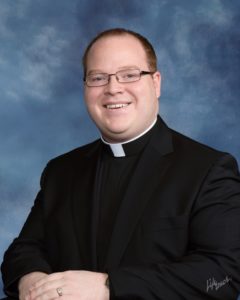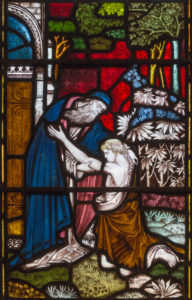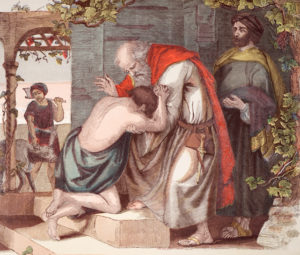 When I was in seminary, I had a professor of the New Testament who insisted that we should rename the “Parable of the Prodigal Son.” His claim—which isn’t wrong—was that the title we’ve given to this parable seems to imply that its focus is on the younger son, who prematurely requests his inheritance, spends it on a life of profligacy, and returns in repentance to the great joy of his father (and to the vexation of his older brother). But reading the parable, it’s clear that Luke doesn’t mean for us to focus on the son so much as on the father, whose response to the waywardness and repentance of his son is categorically generous, to say the least. My professor preferred rather to call this familiar story the “Parable of the Merciful Father.”
When I was in seminary, I had a professor of the New Testament who insisted that we should rename the “Parable of the Prodigal Son.” His claim—which isn’t wrong—was that the title we’ve given to this parable seems to imply that its focus is on the younger son, who prematurely requests his inheritance, spends it on a life of profligacy, and returns in repentance to the great joy of his father (and to the vexation of his older brother). But reading the parable, it’s clear that Luke doesn’t mean for us to focus on the son so much as on the father, whose response to the waywardness and repentance of his son is categorically generous, to say the least. My professor preferred rather to call this familiar story the “Parable of the Merciful Father.”
 Admittedly, what we call a parable is of significantly less importance than what we understand it to mean. But my professor was right in insisting that we must focus on Jesus’ focus.
Admittedly, what we call a parable is of significantly less importance than what we understand it to mean. But my professor was right in insisting that we must focus on Jesus’ focus.
In our Gospel this Sunday, we’re given several parables to ruminate upon—the parables of the lost sheep, the lost coin, and the prodigal son. These are parables we’ve all heard many times before. They center on the themes of “return,” of repentance, of rejoicing. But in our familiarity, we often overlook what the focus of these parables really is: not our subjective experience of conversion or repentance, but the almost foolish abandonment of God in pursuing us.
Our God is relentless! He desires us immensely. I always chuckle a bit when I read the question Jesus poses to the Pharisees and scribes: “What man among you having a hundred sheep and losing one of them would not leave the ninety-nine in the desert and go after the lost one until he finds it?” The answer, of course, is no one! No self-respecting businessman would abandon such a valuable flock—in the desert of all places!—to pursue a single errant sheep. But our God does. Why? Because He’s the lover of His creation. He knows us intimately, and even in our sinfulness (or whatever ways we find ourselves to be undesirable), He pursues us. And when we finally make that return to Him from wherever we’ve been, however we’ve strayed, He rejoices, because we are of greatest value to Him.
 These parables highlight something intensely true about conversion: the emphasis is far less upon us than it is upon our relentless God. If we remove the obstacles we have to conversion, God’s grace cannot help but prevail in our lives. That’s exactly what the Sacrament of Confession is about. It’s about identifying those roadblocks to grace and allowing God to restore us. And we can be assured of this: when we allow Him to pursue us, to manifest His power in our lives, to call us back to Himself, “there will be joy in heaven.”
These parables highlight something intensely true about conversion: the emphasis is far less upon us than it is upon our relentless God. If we remove the obstacles we have to conversion, God’s grace cannot help but prevail in our lives. That’s exactly what the Sacrament of Confession is about. It’s about identifying those roadblocks to grace and allowing God to restore us. And we can be assured of this: when we allow Him to pursue us, to manifest His power in our lives, to call us back to Himself, “there will be joy in heaven.”
Do yourself a favor and let yourself be found. Like the prodigal son, bring yourself to the confessional—to the throne of God’s mercy—and experience the joy God has when we return to Him. Don’t worry or fret, because the work of conversion really belongs to God. For our part, we just have to want to be found.
Fr. Michael Friedel is a Parochial Vicar for the Cathedral of the Immaculate Conception and the Chaplain of Sacred Heart Griffin.